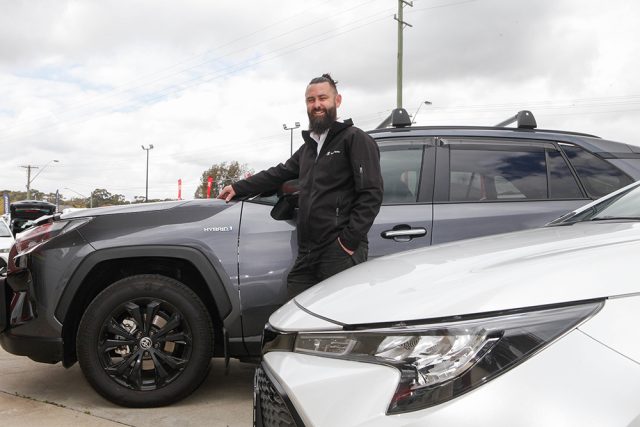As the price of petrol rises and consumers become more concerned about their carbon footprint, the attractiveness of alternative vehicle options charge ahead.
While car manufacturers are looking to the future with expanded electric vehicle (EV) offerings, more infrastructure is needed for motorists, but an expert says hybrid vehicles could bridge the gap.
Selling plug-in EVs overseas, Toyota will be bringing its first electric car – the BZ4X – to Australian showrooms next year.
Penrith Toyota Senior Sales Executive, James Morgan, said there are some factors that EV owners will have to deal with if they make the switch.
“Range anxiety is a real thing where electric owners charge at home and then have to map out their trip as they only have a certain amount of kilometres range or you have to stop to charge for an hour here and there which isn’t convenient in my opinion,” he said.
“You not only buy the electric car but a power socket at home and wall battery, and then if you don’t have solar panels, you are still paying for your electricity as well, as you tap into it to charge your car.”
With debate surrounding if Australia is ready for an uptake of EVs, Mr Morgan agreed that more investment was needed.
“Overseas, such as in Europe, they have the infrastructure to support higher numbers of electric vehicles but governments in those countries have been proactive in preparing to support it,” he said.
“It will be a massive task for Australia to install charging stations around apartment buildings, on public streets or in car parks and then there is the drain on the electricity grid and how to combat that.”
As the market still evolves, and in a bid to get the “best of both worlds”, Mr Morgan said hybrid vehicles are a popular choice with customers.
“With our hybrid synergy drive system, we have a petrol energy coupled with an electric motor and electric motor generator, which substitutes the power essentially needed for the vehicle to give it better economy,” he said.
“It is self-charging while you drive, so you don’t need to take it home and plug it in. You use petrol but it is longer between fill ups because you are substituting approximately 30 per cent of your usage on a day-to-day basis.”
With Toyota selling hybrid cars for the past 25 years, the interest in them seems to still be increasing.
“In 2017, the number of hybrids sold in Toyota across the year was around 8,500 cars and in 2021 it exploded to just shy of 55,000 units that year,” he said.
“The fuel tank in a hybrid is 10 litres smaller than a traditional petrol car but you are getting, on average, an extra 400 kilometres per tank, so it is a good option.”
Emily Feszczuk
A graduate of Western Sydney University, Emily covers Local, State and Federal politics for the Weekender, as well as crime and general news.

